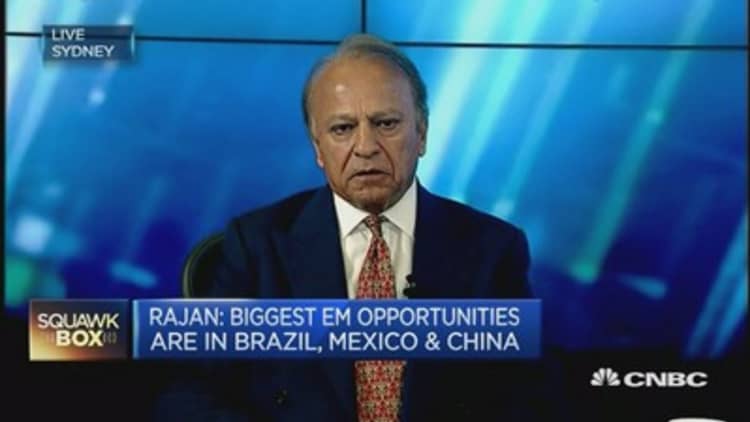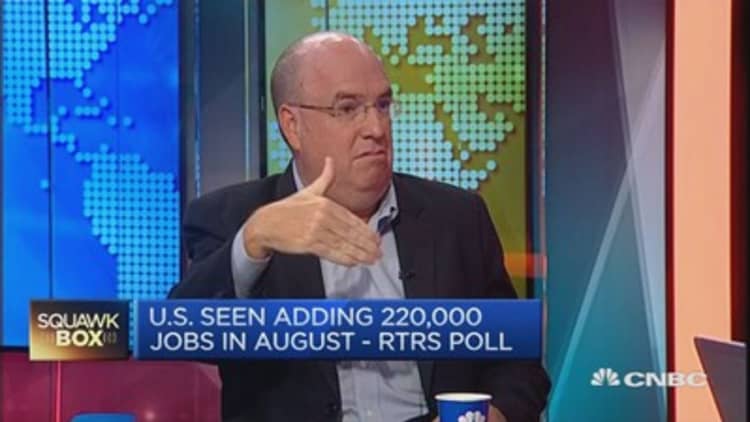Asian stocks declined on the final trading day of the week, as investors awaited the U.S. nonfarm payrolls report for August that may play a crucial role in the Federal Reserve's decision about when to lift interest rates.
A strong jobs number could allay fears over global growth, but it could rekindle speculation of an interest rate hike in the U.S. as soon as this month, which could hurt risk assets, particularly in emerging markets.
According to a Reuters survey, U.S. nonfarm payrolls likely increased by 220,000 jobs in August, after July's 215,000 rise.
"The Fed has alluded to the importance of sustained labor gains, and investors will sit on the edge ahead of the print. A strong print will no doubt fuel speculation that a September rate increase would materialize," IG's market strategist Bernard Aw wrote in a note.
Overnight, major U.S. indexes ended mostly higher. The Nasdaq Composite shed 0.4 percent, while the blue-chip Dow Jones Industrial Average and S&P 500 ticked up 0.1 percent each.
Nikkei skids 2.2%
Japan's benchmark Nikkei 225 index clawed back some losses in the final hour of trading to finish at its lowest level since August 26.
The Tokyo bourse kicked off the day on a positive note, but succumbed to wild swings which brought the index down to a seven-month low of 17,608 on the back of a rejuvenated yen. The Japanese currency strengthened 0.5 percent against the U.S. dollar in Asian trade, denting risk appetite for most counters.
Meanwhile, the broader Topix index closed down 2.06 percent.
Export-oriented stocks tumbled into the red; Panasonic lost 4 percent, while Toyota Motor, Sony and Toshiba lost more than 2 percent each.
Selling pressure also intensified for shares of heavyweight components such as SoftBank, which sold off 4.1 percent after Barclays downgraded its rating for the stock to 'underweight' from 'overweight,' and lowered its target price for the stock to 7,500 yen from a previous target of 8,400 yen. Fast Retailing and industrial robot maker Fanuc also weighed down the bourse by easing 2.8 and 2 percent, respectively.
Data released by the Japan Exchange Group on Thursday showed net selling of Japanese cash and futures stocks by foreign investors last week hit a record high, as worries over a China-led slowdown intensified.
Foreigners, who were also net sellers in the previous two weeks, sold a total of 707.05 billion yen ($5.89 billion) worth of Japanese cash stocks during the week of August 24-28, the biggest weekly selling since March 2014.

ASX adds 0.3%
Australia's S&P ASX 200 index finished modestly higher after swinging between gains and losses all day long.
The day's gainers included market bellwether BHP Billiton, which elevated 1.5 percent. Other iron ore miners Rio Tinto and Fortescue Metals climbed 1 and 2 percent, respectively.
Financial shares were choppy on Friday; Macquarie Group erased early gains to close down 0.1 percent. Westpac, National Australia Bank and Australia and New Zealand Banking closed down between 0.4 and 0.8 percent, whileCommonwealth Bank of Australia edged up 0.3 percent in late-day trading.
In the currency space, persistent worries about the health of China's economy pushed the Australian dollar below 70 U.S. cents, hitting a six-and-a-half-year low.
Read MoreSamsung: Our smartwatch has over 1,000 apps
Kospi loses 1.5%
South Korea's Kospi index slid deeper into the red, following the deterioration in trading sentiment across the region.
Among tech names which outperformed the bourse earlier on, Samsung Electronics trimmed gains to 0.6 percent. LG Display and Samsung SDI bounced up 3.1 and 1.4 percent respectively, but chipmaker SK Hynix surrendered gains to close down 1.6 percent.
Carmakers were among the biggest laggards, with Hyundai Motor and Kia Motors down 1.3 and 0.9 percent, respectively. Shares of cosmetics makers remain under pressure; AmorePacific and LG Household & Healthcare slid 3.9 and 1.9 percent, respectively.
Outperforming the bourse, the country's largest logistics CJ Korea Express Corp. surged 1.7 percent after it said it was in final talks to acquire China's Rokin Logistics.
Hang Seng drops 0.4%
Hong Kong's key Hang Seng index closed down as investors took advantage of the resumption of trade in Hong Kong to sell the shares of mainland-listed companies listed offshore. In particular, the Hang Seng China Enterprises Index tumbled 1.4 percent, making it one of the worst performers in the region.
On the domestic data front, the Nikkei Hong Kong purchasing managers' index (PMI) fell to a six-year low of 44.4 in August, from 48.2 in July, underscoring a slowdown in the city's private sector economy. The latest PMI figure also marked a contraction for the sixth consecutive month.
Hong Kong markets were closed on Thursday, as China commemorates the 70th anniversary of the end of World War Two. Meanwhile, China's stock market reopens on Monday.

Rest of Asia
India's benchmark S&P BSE Sensex index and the 50-share Nifty index slumped 2 percent each, giving up gains from the previous session on offshore losses and anxiety ahead of the U.S. jobs report due later in the global day.
In Southeast Asia, Singapore's benchmark Straits Times index lead losses with a plunge of 1.4 percent, touching its lowest level since August 26.

